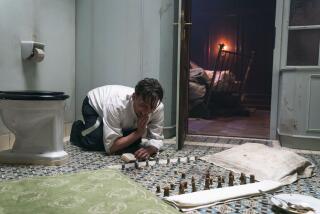A perilous chess game of power and politics
- Share via
“ZUGZWANG” is the perfect title for Ronan Bennett’s fifth novel, but it is difficult to pronounce and so might pose problems in recommending this absorbing book, orally at any rate.
Chess aficionados will probably be familiar with the term, and they may be especially drawn to “Zugzwang” because an international chess competition and the game itself relate to its plot. But nonplayers, even those who have no interest in chess, can rest assured that they will still be able to enjoy this pungent novel. Bennett is too skilled a writer not to make sure of that.
And he helpfully provides a concise but telling definition before the action commences: “Derived from the German, Zug (move)+ Zwang (compulsion, obligation). In chess it is used to describe a position in which a player is reduced to a state of utter helplessness. He is obliged to move, but every move only makes his position even worse.”
In other words, this condition is akin to a diabolical knot which grows only tighter the more that the hapless bound hands struggle to loosen it. And it is in this state that the novel’s protagonist, Otto Spethmann, a celebrated Jewish psychoanalyst practicing in the Russian capital of St. Petersburg, and many of its other characters, find themselves
St. Petersburg in March 1914 is a pretty fraught place. War will break out less than six months later and there is a definite avant le deluge feeling in the air. There’s also plenty of turmoil: Revolutionaries are struggling against the czarist autocracy and are being met with brutality and ruthless force.
Spethmann and other characters are more interested in pursuing their lives than in current events and historical forces. (This being Bennett, there are the graphic sex scenes you’d expect to find.) But to paraphrase that great real-life Russian revolutionary, Leon Trotsky, history is interested in the characters even if they are not interested in it.
Bennett knows about that from his own experience. Wrongly convicted at age 17 of murdering a policeman by a “special” jury-less court in his hometown of Belfast, Northern Ireland, Bennett served time in the notorious Long Kesh prison near there. After being exonerated, he again found himself charged, this time in London, with being a terrorist; he was acquitted after conducting his own defense. The scenes in “Zugzwang” involving imprisonment and police interrogation have an immediacy and feel that could only come from firsthand experience.
Bennett is also adept at portraying the atmosphere of suspicion that permeates St. Petersburg, which will come as no surprise to readers of his novel “Havoc, in Its Third Year,” set in early 17th century England obsessed with “Popish Plots” and Roman Catholic fifth columns. In early 20th century Russia, the focus of suspicion is on Jews; not all revolutionaries at that time and place were Jewish, but the deeply ingrained anti-Semitism of the society found its way easily into the methods and mind-set of the security forces, official and rogue alike.
The parallels to British attitudes toward the Irish and to today’s suspicion of Muslims in Western societies are clear, for instance in a scene where the atheist Spethmann is observed reading the Talmud in his prison cell:
“It amused me that when we played chess the old jailer would eye the sacred text suspiciously, uncertain whether it was safe to be in the same room as so potent a token of alien magic.” During the pair’s chess matches, the ignoramus alternates his execrable moves with vintage effusions of anti-Semitic cliches:
“ ‘Your people,’ he said matter-of-factly, ‘make the best players . . . more than half of those who will be playing in the great tournament are Jews.’
“Then he said, following a mental progression of his own contrivance, ‘Almost every single prisoner down here is a Jew. A few of them are educated but they’re not like his honour. Ruffians, most of them, and filthy. When you ask them why they murder good Christians, they just laugh. Well, they won’t be laughing when the hangman puts the noose around their necks.’ ”
As in Bennett’s 1999 novel “The Catastrophist,” set in the roiling turbulence of the Congo immediately following its independence from Belgium, the atmosphere of “Zugzwang” is thick with menace. Bennett once again does not shrink from violence here: This is a world not only filled with moral choices leading to dangerous consequences but also one where revolutionaries do not hesitate to pour corrosive acid on people’s faces.
The prose style of his latest novel is even better than that of “The Catastrophist”: more edgy and evocative. The large number of suspenseful twists and turns may owe to the fact that “Zugzwang” was serialized as it was being written, a rare throwback to the 19th century heyday when such writers as Charles Dickens wrote their novels that way. But Bennett must have tightened the book since it appeared serially in London’s The Observer, and his taut authorial control is evident on every page of this gripping tale.
--
Martin Rubin is a critic and the author of “Sarah Gertrude Millin: A South African Life.”
More to Read
Sign up for our Book Club newsletter
Get the latest news, events and more from the Los Angeles Times Book Club, and help us get L.A. reading and talking.
You may occasionally receive promotional content from the Los Angeles Times.









